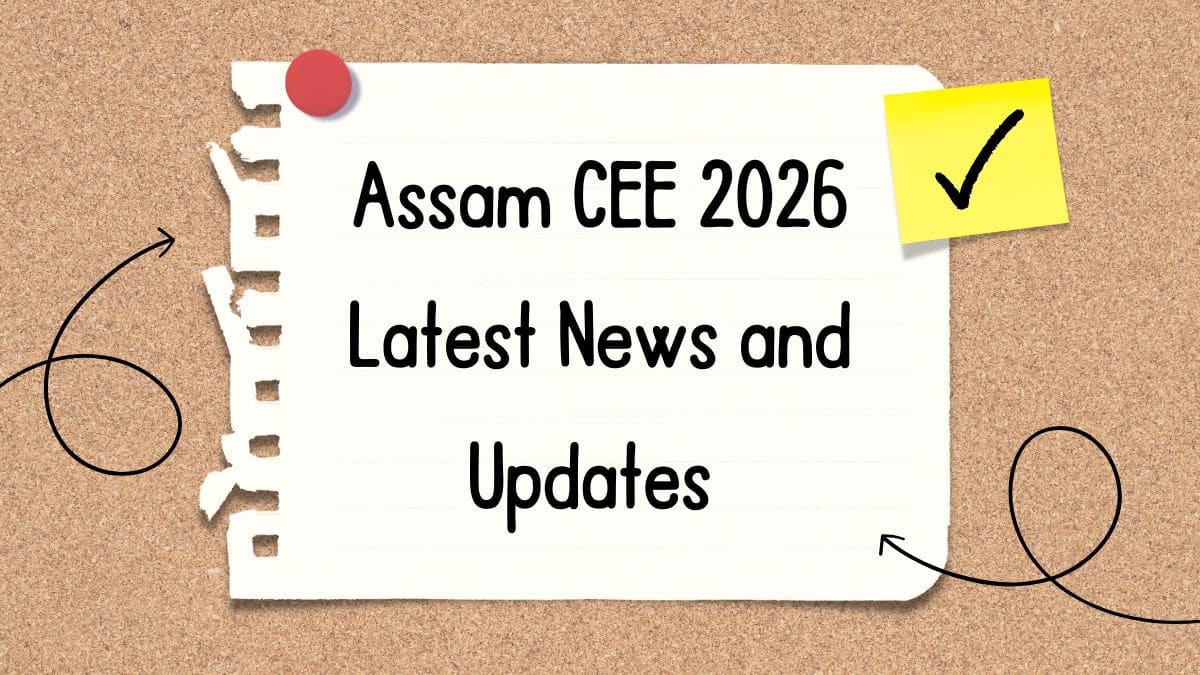UPES B.Tech Admissions 2026
Last Date to Apply: 28th Feb | Ranked #43 among Engineering colleges in India by NIRF | Highest Package 1.3 CR , 100% Placements
Assam CEE 2026 Latest News and Updates - The Assam Science and Technology University will issue the Assam CEE 2026 notification in February 2026. The Assam CEE 2026 registration will begin in February 2026. Candidates are advised to check the Assam CEE 2026 eligibility criteria before applying. The authority will release the Assam CEE 2026 information brochure, announcing the important dates, exam pattern and steps to fill out the application form. The exam date for Assam CEE 2026 will be announced online. The Assam CEE exam will be conducted in April 2026. All the latest information regarding the Assam CEE will be updated on this page. Candidates must be updated with the Assam CEE 2026 latest news and updates to avoid missing any events.

The authorities will release the information regarding the Assam CEE 2026 on the official website. Candidates are advised to keep visiting this page to get regular updates on the Assam CEE 2026.
Events | Dates |
Release of Assam CEE application form | February 2026 |
Last date to apply for Assam CEE 2026 | February 2026 |
Last date to pay application fee | March 2026 |
Availability of Assam CEE admit card | March 2026 |
Last Date for Assam CEE application form correction | March 2026 |
Assam CEE exam date 2026 | April 2026 |
Assam CEE provisional answer key 2026 | April 2026 |
Declaration of Result | May 2026 |
Counselling Process start and end date | June 2026 |
Event | Dates |
Round 1 seat allotment | July 2026 |
Uploading of acceptance by candidates | July 2026 |
Document verification by institutes | July 2026 |
Submission of Admission Report and Vacancy List by respective institutes to DTE Office | July 2026 |
Display of Vacancy List received from institutes after 1st online counselling | July 2026 |
Round 2 seat allotment | July 2026 |
Uploading of acceptance by candidates | July 2026 |
Document verification by institutes | July 2026 |
Submission of Admission Report and Vacancy List by respective institutes to DTE Office | July 2026 |
Withdrawal of Seat [10% fee will be retained by the admitted College. Rest will be refunded to Studeent) | July 2026 |
Round 3 seat allotment | August 2026 |
Uploading of acceptance by candidates for round 3 | August 2026 |
Reporting to allotted institute | August 2026 |
Cancellation of seat [If final Admission is not taken] | August 2026 |
Round 4 seat allotment result | August 2026 |
Acceptance against allotted seats along with Acceptance Letter and necessary documents upload. | August 2026 |
Physical Admission along with Document (Original) Verification at the respective Institute for Counselling Round 1, 2, 3 & 4 | August 2026 |
Submission of Admission Report and Vacancy List by respective institutes to DTE Office | August 2026 |
Display of Vacancy List received from institutes after 4rd online counselling | August 2026 |
Allotment of seats of 5th online counselling. | September 2026 |
Acceptance against allotted seats along with Acceptance Letter and necessary documents upload. | September 2026 |
Physical Admission along with Document (Original) Verification at the respective Institute | September 2026 |
Submission of Admission Report and Vacancy List by respective institutes to DTE Office | September 2026 |
Display of Vacancy List received from institutes after 5th online counselling | September 2026 |
Frequently Asked Questions (FAQs)
Assam CEE 2026 exam is expected to be held in April 2026.
The Assam CEE 2026 application form will start in February 2026.
The authority will release the Assam CEE 2026 syllabus on the official website.
The full form of CEE is the Combined Entrance Examination.
The official website of Assam CEE is astu.ac.in.
On Question asked by student community
Hello,
Yes, you can use your improved mark sheet for Assam CEE.
Assam CEE allows candidates to show their latest and updated Class 12 marks as long as the candidate has passed the exam with the required percentage.
So if you appear for the betterment exam in Chemistry and Alternative
The best way to prepare for the SSUHS B.Sc. Nursing Entrance Exam (Assam CEE) is through extensive practice with previous years' papers! While finding exactly 10 years' worth of official papers can be difficult, the provided resource offers a dedicated hub for accessing the SSUHS B.Sc. Nursing Question Paper PDFs.
HEY THERE!!
Hello,
Here is the link where you can get complete syllabus for Assam CEE B.Sc. Nursing 2025 :- Assam CEE Syllabus 2025
Hope it helps !
Hello!
Gauhati Medical College, Guwahati offers UG level MBBS course. Other courses include MD, MS and PGD degree programmes such as:
Among top 100 Universities Globally in the Times Higher Education (THE) Interdisciplinary Science Rankings 2026
Recognized as Institute of Eminence by Govt. of India | NAAC ‘A++’ Grade | Upto 75% Scholarships
Highest CTC 44.14 LPA | UGC Approved | 1600+ Recruiters | 100% Placement
NAAC A++ Grade | Recognized as Category-1 Deemed to be University by UGC | 41,000 + Alumni Imprints Globally
India's youngest NAAC A++ accredited University | NIRF rank band 151-200 | 2200 Recruiters | 45.98 Lakhs Highest Package
NAAC A++ Accredited | Accorded institution of Eminence by Govt. of India | NIRF Rank #3